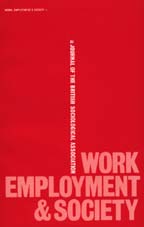Article contents
Seeking the Balance between Flexibility and Security: A Rising Issue in the Low Countries
Published online by Cambridge University Press: 14 June 2001
Abstract
Belgian policy-makers are coming to regard the Netherlands as a ‘model’. Belgian observers commenting on the ‘Dutch miracle’ frequently refer to the greater flexibility of the deployment of labour. The share taken by temporary employment is indeed much lower in Belgium. The OECD links this ‘shortfall’ to an excess of protective regulations (Belgosclerosis). In this paper we critically evaluate the theoretical arguments cited for relaxing the right of dismissal and the use of flexible forms of employment. On the basis of this theoretical exercise, we compare the Belgian and Dutch policies on dismissal protection, prevention of dismissal and temporary employment. We examine whether differences in institutional embedding lead to differences in the way in which companies seek to achieve flexibility. The main conclusion is that the institutional frameworks of Belgium and the Netherlands have been built up along different lines. Dutch legislation encourages contractual flexibility. Belgian legislation focuses more on temporal flexibility. A competition for the greatest flexibility has little point given these observations. It is not a question of ‘more’ or ‘less’, but of ‘different’ flexibility. The wider significance of the comparison is that it clearly demonstrates that the compromise between flexibility and stability (and job security) can be forged in different ways.
- Type
- Original Articles
- Information
- Copyright
- 2001 BSA Publications Limited
- 14
- Cited by




